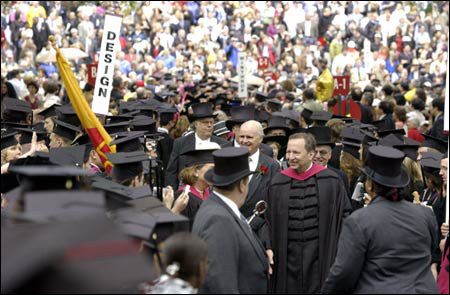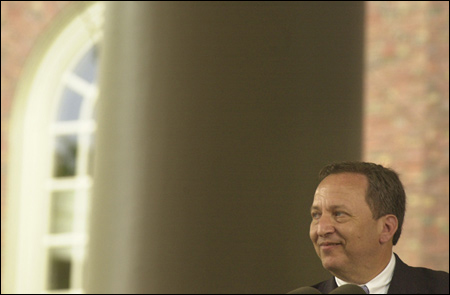Shrinking the opportunity gap
President Summers describes Harvard’s role in making the American Dream more accessible to all

Harvard is committing financial and scholarly resources to widening access to high-quality education, President Lawrence H. Summers said at the Annual Meeting of the Harvard Alumni Association (HAA) during the Afternoon Exercises of Commencement.
With much of the state-of-the-University business handled by HAA President James V. Baker ’68, M.B.A. ’71, and Robert G. Stone Jr. ’45, chair of the Committee on University Resources, Summers focused his remarks to the large crowd on how Harvard can help the United States achieve equal opportunity, a goal he said has become elusive.
“The American Dream has become more remote in America over the last two decades as the gap between the life prospects of the children of the fortunate and the less fortunate has widened,” he said.
Summers trained his economist’s eye on data that supports this statement. While median family incomes have increased 18 percent since 1979, the incomes of the top 1 percent of families have jumped by 200 percent. And as education and economic success have become linked more strongly, the disparities in access to education across income groups have also increased. In America today, a student from the top income quartile is more than six times as likely as a student from the bottom quartile to receive a B.A. within five years of leaving high school.

“The way in which education operates in society may actually be adding to the problem,” said Summers.
While Harvard has a better representation of lower-income students than other selective institutions, “we have some distance to go,” he said. He cited the University’s recent pledge to free families with incomes of less than $40,000 from contributing to the cost of attending as one way that Harvard is meeting this challenge of achieving equal opportunity, he said.
Running parallel to this financial initiative will be admissions outreach to students of disadvantaged backgrounds similar to the techniques that have been successful in recruiting talented minority students to Harvard College, said Summers. He added that the admissions process will evaluate students with a subtlety that takes into account students’ backgrounds and circumstances alongside academic achievements and test scores.
“It has to be a matter of concern that the classrooms of the SAT prep courses in America are probably the least economically diverse,” he said.
Harvard’s commitment to leveling the academic playing field must not be confined to its own students, but rather should reach into the pipeline of would-be students of Harvard and other universities, Summers continued, outlining several initiatives that will affect change at the pre-college level.
“The battle for America’s future will be won or lost in American public schools,” he said.
Harvard’s new Crimson Summer Academy, created this past year, is an intensive summer program for academically talented Boston-area high school students from disadvantaged backgrounds. “We are giving them a chance because, if we do, institutions like ours will have a stronger and better student body with which to pursue excellence in the years ahead,” he said.
Summers also pointed to several ways the Graduate School of Education (GSE) is addressing public education in America. Enhanced financial aid via the Presidential Scholars program will help attract talented students to the field of education, as well as other public-sector industries, and ongoing support of education research will ensure that scholars of education can continue to address the field’s most pressing issues.
Summers’ remarks touched briefly on other University-wide issues that made headlines this past year – the Faculty of Arts and Sciences’ curriculum review and Harvard’s leadership role on stem cell research at a time political pressure has forced others to withdraw from it – but devoted the majority of his talk to Harvard’s role in and commitment to linking education and equal opportunity.
“Let us all who are so proud of our association with Harvard ensure that our University affirms its promise and does everything it can in the quest for equal opportunity in America,” he concluded.




